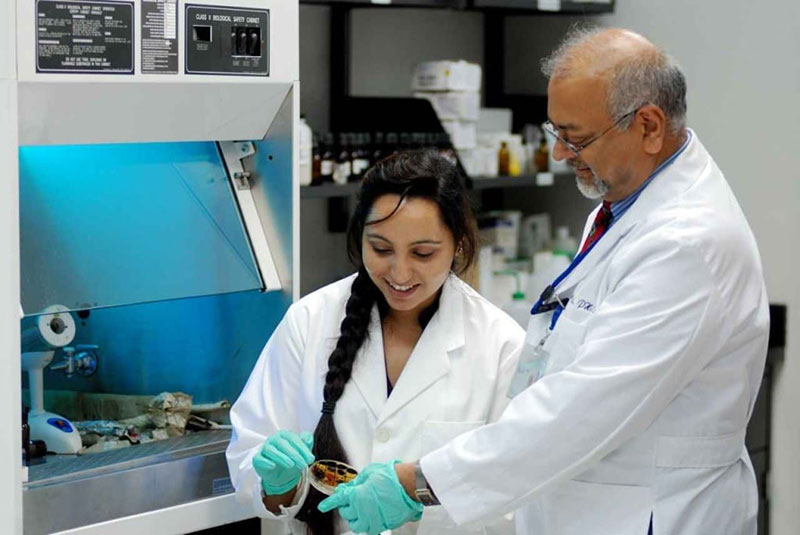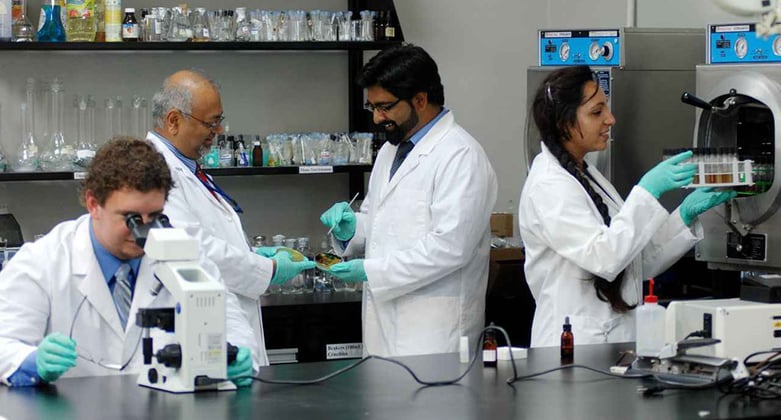Could the 2012 meningitis outbreak in the United States have been averted?
Can a similar outbreak be prevented in the future?
The mold research at the University of Medicine and Health Sciences (UMHS) was initiated at the beginning of the 2013 precisely to develop a model for answering key questions about fungal presence in the air, food and formulations. A manuscript detailing a simple model that is proposed for global surveillance of the air, based on studies in the island of St. Kitts, has been accepted for publication in 2014 in the online journal Virology and Mycology.
The project led by Dr. Girish J. Kotwal UMHS Professor of Microbiology and Biochemistry, attracted a team of UMHS medical students eager to do research. The students then had the opportunity to be involved in all aspects of the research project from planning, to field work, to manuscript preparation and authorship. The UMHS medical students and faculty participating in the project were James Bassford, Atandra Burman, Nalliene Chavez, Zachary Ciochetto, Kristen Duman, Elise Landa, Alyssa Mahon, Samuel Park, Irshad Prasla, Harleen Saini, Torib Uchel, as well as Dr. James Adekeye.
The project involved mapping areas of high mold counts around the island that could potentially cause opportunistic infections and food spoilage from fungal growth. If the FDA had required similar environmental air and subsequent outgoing product testing by the company making the formulations in Massachusetts, they would have been able to determine the presence of fungi and therefore that the air in that facility did not provide a suitable environment for dispensing injectables. If they had tested the formulated products for fungal contamination, those contaminated lots of the injectable steroid methylprednisolone acetate (MPA) would have been deemed unfit for administration into the human spinal fluid, the path of least immunological resistance. The multiple deaths, hospitalizations and suffering that resulted from the presence of Exerholium rostratum could have been averted by this simple testing, as being proposed in the manuscript.

Professor Kotwal with student researcher Harleen Saini in the UMHS Microbiology Lab discussing mold growth results. Photograph by medical student, Matthew Carpenter.
Hopefully, the FDA can impose a requirement on all manufacturers of injectables in the future, that they test both the air in their facilities where the formulation takes place, and the product before it is shipped to market. As with all products for human consumption, safety is of paramount importance. Procedures to ensure their safety are simply part of good manufacturing practice.
But what were the results for St. Kitts you ask? Is St. Kitts air mold-free? Areas of high mold count were identified and once the research study report is published in 2014, a link will be provided to the journal article where you will be able to read the detailed results.
UPDATE Feb 25, 2014:
The UMHS Research Committee is pleased to announce that this case report has now been published in the latest edition of the online open access journal Virology & Mycology (ISSN: 2161-0517).
Citation & Link:
Prasla I, Duman K, Ciochetto Z, Burman A, Mahon A, et al. (2013) Significant Heterogeneity in Airborne Mold Quantities on the Caribbean Island Of St. Kitts: Health Implications and Impact on Food Preservation. Virol Mycol 3:123. doi: 10.4172/2161-0517.1000123
(Top photo): UMHS students doing air-borne mold research in the Microbiology lab on the St. Kitts campus. Left to right are Zachary Ciochetto, Dr. Girish Kotwal, Irshad Prasla and Harleen Saini. Photograph by medical student, Matthew Carpenter.
About UMHS:
Built in the tradition of the best US universities, the University of Medicine and Health Sciencesfocuses on individual student attention, maintaining small class sizes and recruiting high-quality faculty. We call this unique approach, “personalized medical education,” and it’s what has led to our unprecedented 96% student retention rate, and outstanding residency placements across the US and Canada. UMHS is challenging everything you thought you knew about Caribbean medical schools.

Ann Celestine, M.L.S., B.A., A.H.I.P. is Director of Library & Educational Applications, Professor of Library Research. Professor Celestine oversees all daily library and exam center operations at the Anne Ross Library at UMHS.
















